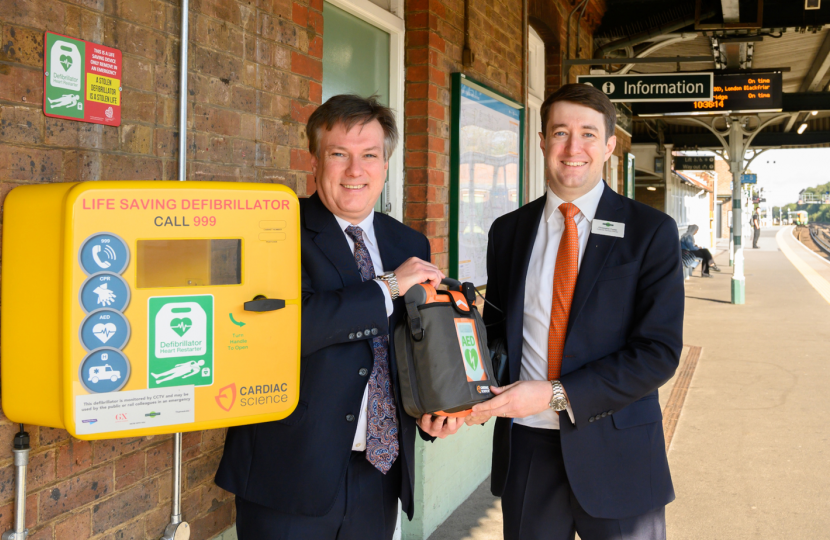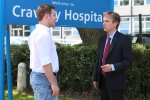
- Life-saving defibrillators used in less than one in 10 cardiac arrests as tens of thousands remain unregistered.
Henry Smith MP has joined leading charities and health organisations in urging defibrillator owners in Crawley to register their devices on a new national database, called The Circuit, which could help save thousands of lives from cardiac arrests in the coming years.
There are more than 30,000 out of hospital cardiac arrests every year in the UK, but less than one in ten people survive. Every minute that passes without CPR or defibrillation reduces the chances of survival by up to 10 per cent, but immediate CPR and defibrillation can more than double the chances of survival.
Henry said;
“I’m pleased to join with organisations including the British Heart Foundation to urge defibrillator owners to make sure their devices are registered on The Circuit.
“In a life-or-death situation it could be vital that a 999 call handler knows exactly where the nearest defibrillator is. Registering your defibrillators with The Circuit could help someone get life-saving treatment sooner when every minute counts.
“Last month I was at Three Bridges Station which has seen two new defibrillators installed. Such facilities are incredibly important and it’s vital that all of these life-saving devices are registered for the fastest possible use in an emergency.”
The British Heart Foundation (BHF), Resuscitation Council UK (RCUK) St John Ambulance and Association of Ambulance Chief Executives (AACE), warn that the UK’s low survival rate is likely to be in part because public access defibrillators are used in less than one in 10 out of hospital cardiac arrests.
This is often because 999 call handlers are not always aware that a defibrillator is available nearby because the ambulance service has not been told about it. If they do not know it is there, they cannot direct someone at the scene to retrieve it while waiting for the ambulance to arrive.
To help save more lives, the BHF, RCUK, St John Ambulance and AACE are urging people who look after defibrillators across Crawley in places such as offices, communities, shopping centres and leisure centres, as well as in public places, to register them on a pioneering database called The Circuit: The national defibrillator network.
While the 14 ambulance services have previously had their own regional databases, The Circuit will eventually replace these with a new national database that lets the ambulance services see defibrillators across the UK once it has been rolled out. This will allow them to direct people to the nearest defibrillator when somebody is having a cardiac arrest, wherever they are.
The Circuit, which is already live in 12 of the 14 ambulance service regions across the UK and will become nationwide soon, could help to save thousands of lives – but it is vital that as many defibrillators as possible are registered on the database for it to work effectively.
Those who own and maintain defibrillators, also called defibrillator guardians, can still register their devices in areas that are not yet live on The Circuit, ready for when their ambulance services come online.
It is estimated that there are tens of thousands of defibrillators which are still to be registered on the new system. To make sure opportunities to save lives are not being missed, the organisations are aiming to see 70,000 additional defibrillators unknown to The Circuit registered by the end of the year.
Guardians can register their device by visiting: www.thecircuit.uk.


